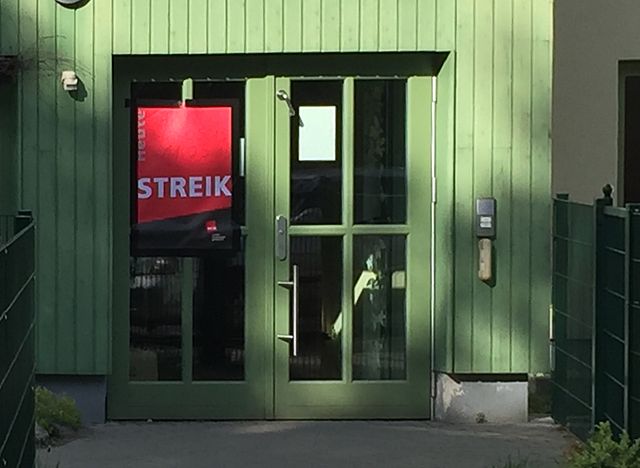As a parent, you love your kid more than anything. But you love them even more when you drop them off at daycare. Those seven hours are your only chance to go to the supermarket without a tiny person screaming about Kinder chocolate.
When workers at Berlin’s publicly owned Kitas went on strike for five days this summer, it was hell for parents. They had to pacify their offspring with Youtube videos while trying to focus on Zoom calls. It was especially bad for immigrant parents, who are less likely to have grandparents nearby.
Today, Monday, the struggle was going to continue with an unlimited strike. This has never happened in Berlin before. In the two unions, Verdi and GEW, 92 percent and 82 percent of members voted to take the unprecedented step of striking until their demands are met.
It’s not that daycare workers don’t care about children and parents. It’s the opposite: they care so much that they can’t allow conditions to keep deteriorating. Erzieher*innen report that they are so understaffed that sometimes they are alone in a room with 30 kids, without even the time to change diapers, let alone do anything educational.
As a result, Kita workers get sick far more than average. This isn’t only because of kid viruses – sick days have been going up in the last few years as pressure has grown, a study shows. It comes to the conclusion that Germany would need an additional 97.000 daycare workers to cover the time lost due to illness, vacation and training.
Unions want the city government to sign a contract for Entlastung, for »relief«. In other words, they want written rules about how many workers are needed for how many kids. The government says such a contract is impossible – even though Berlin’s public hospitals already signed such agreements with unions, after years of strikes.
On Saturday, however, a court banned the Kita strike. The reasons are complex, but the bottom line is that workers in Germany only are allowed to strike under certain circumstances: They only have a right to form coalitions, while strikes are limited to very narrow parameters. In practice, a judge can declare workers’ actions to be »disproportionate« and therefore illegal. The union is appealing this attack on workers’ rights.
One petition signed by over 5.000 parents opposes a strike »carried out on the backs of the children«. But it’s not the strike that endangers kids – it’s the permanent understaffing. Kitas are trapped in a vicious circle: the work is impossible due to a lack of personnel; therefore, people go part time or quit; that makes the problem even worse. The only solution would be to break with Germany’s permanent austerity regime and invest in childcare.
But Berlin’s Senate has denied there is a problem – according to the education senator, there is no “conflagration”. That makes you wonder why 80-90 percent voted to strike, and why so many are sick.
As parents, the strikes are a crushing inconvenience. My friend Bob told that his brain gets “fried” trying to work with kids at home: “We end up having to work late at night to keep up with our responsibilities.”
But imagine what would happen if all those daycare workers quit! Then every day would be like a strike day.
The current strikes affect only the publicly-owned Kitas in Berlin, with about 29.000 kids and 7.000 employees – or about a fifth of the total. My own kid’s Kita is run by a non-profit. If my Kita was out of service for a week, I know it would test my solidarity. But Bob said he went to a union demonstration in front of city hall last Friday, and that reminded him how important high-quality childcare is for everyone. He was happy that the union had reached out to parents this time.
This is a mirror of Nathaniel’s red flag column for Neues Deutschland. Reproduced with permission




